|
|
|
Sort Order |
|
|
|
Items / Page
|
|
|
|
|
|
|
| Srl | Item |
| 1 |
ID:
187444
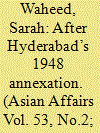

|
|
|
|
|
| Summary/Abstract |
This paper revisits the violent annexation of the erstwhile princely state of Hyderabad by the Indian army in 1948 as an inaugural moment of dispossession to reconstruct Hyderabad's twentieth century past along the axes of Muslim belonging and memory. I argue that we must situate twentieth and twenty-first century Hyderabadi Muslim migration in relation to Partition-related displacements and attempts to overcome them through economic conditions provided by migration. The partition of India prompted waves of migration—such as the later migration of Hyderabadi Muslims to the Persian Gulf in the wake of 1970s oil boom—and their sense of displacement persisted long past the mid-twentieth century, reshaping Muslim notions of belonging. The use of the nation-state as the dominant framework to analyze these shifts is insufficient for understanding Hyderabadi Muslims' sense of belonging and citizenship, which must be also contextualized in terms of upward class mobility along the axes of global and local contexts.
|
|
|
|
|
|
|
|
|
|
|
|
|
|
|
|
| 2 |
ID:
160028
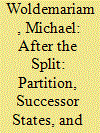

|
|
|
|
|
| Summary/Abstract |
Why do partitioned successor states engage one another in armed conflict? We explore the drivers of war between successor states by comparing two border crises that followed the partitions of Ethiopia (1993) and Sudan (2011). We argue that the politico-military struggles that give way to partition create important historical memories that shape what successor states think about the utility of military force. While the partition of Ethiopia yielded successor states led by regimes that were victors of the preceding war of partition, the war of partition in Sudan produced successor states that emerged out of military stalemate. This distinction explains why Ethiopia and Eritrea waged a costly border war that Sudan and South Sudan were able to avoid.
|
|
|
|
|
|
|
|
|
|
|
|
|
|
|
|
| 3 |
ID:
133202
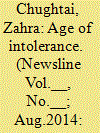

|
|
|
|
|
| Publication |
2014.
|
| Summary/Abstract |
To ensure our success as nation, we need to turn our attention to the country soul since the vast subcontinent was divided, and than some 20 odd years later sub-divided once again, Pakistanis have plenty to ponder.
|
|
|
|
|
|
|
|
|
|
|
|
|
|
|
|
| 4 |
ID:
077537
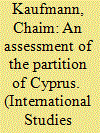

|
|
|
|
|
| Publication |
2007.
|
| Summary/Abstract |
This paper proposes a standard for evaluation of possible solutions to communal conflicts, including partition, based on protection of human life. A partition should be judged successful only if it costs fewer lives than the expected loss of life under any alternative. Solutions to communal conflicts should also be stable over long periods, eliminating or drastically reducing fears of people in the affected communities that they could become victims of renewed violence. An assessment of the 1974 partition of Cyprus is presented, which finds that its net impact on human life remains uncertain-principally because the partition occurred so quickly after the July 1974 coup by Greek Cypriot ultra-nationalists that was the main source of fear of very large-scale ethnic cleansing that we cannot know what the new government might have done. What we can confidently say is that, absent partition, deadly communal violence in Cyprus would have continued to recur and that there are grounds, including the behavior of the July coup regime, for guessing that the ultimate cost would more likely have been higher rather than lower than that of partition. Partition has also enforced peace on Cyprus for 32 years, which may have contributed to the improved climate, compared with 30 or 10 years ago, for eventual reunification
|
|
|
|
|
|
|
|
|
|
|
|
|
|
|
|
| 5 |
ID:
187445
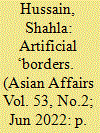

|
|
|
|
|
| Summary/Abstract |
This article focuses on the contested region of Kashmir and investigates how the nation-building project that accompanied the partition of the South Asian subcontinent, along with the creation of the ceasefire line that divided the former princely state of Jammu and Kashmir between India and Pakistan, shaped the question of belonging for the majority of its Muslim inhabitants, especially from the 1940s to the 1960s. It reveals the bureaucratic procedures put in place by the new nation-states, both driven by the question of self-determination pending in the United Nations and devoid of human considerations, made Kashmiris apprehensive about the motivations of both states. The article argues that Kashmiri belonging after partition did not seamlessly merge into the national identities of India or Pakistan. Instead, the anxieties of partition and structural challenges created by the arbitrary ceasefire line shaped Kashmir Muslim perceptions. Drawing from intercepted letters, pamphlets, and biographies, this article reveals the irrelevance of such artificial ‘borders’ in the Kashmiri psyche. In the process, it asserts that the Kashmiri demand for self-determination became intertwined with the desire for the reunification of the old princely state that would promote human-to-human contact, reopen old trade routes, and promote economic self-sufficiency.
|
|
|
|
|
|
|
|
|
|
|
|
|
|
|
|
| 6 |
ID:
172865
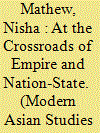

|
|
|
|
|
| Summary/Abstract |
This article investigates gold smuggling in the twentieth-century western Indian Ocean. It illustrates how gold, condemned as a ‘barbarous relic’ by international monetary economists and central banks in the immediate post-war period, created an economy in the intermediate zone between a retreating empire and emerging nation-states in India and the Persian Gulf. Bombay and Dubai—connected by mercantile networks, trading dhows, migrants, and ‘smugglers’—were the principal constituencies and key drivers of this trans-regional economy. Partition and the concomitant flight of Indian mercantile capital into Dubai becomes the key to unlocking the many dimensions of smuggling, including its social organization and ethnic constitution. Looked at in such terms, gold smuggling reveals a transnational side to both partition and the post-colonial history of Bombay which has drawn little critical attention from historians. Consequently, it expands the analytic space necessary to explain how Dubai was able to capitalize on the arbitrage possibilities offered by import regulations in India, tap into the global networks of trade and finance, and chart its own course of development as a modern urban space throughout the latter half of the twentieth century.
|
|
|
|
|
|
|
|
|
|
|
|
|
|
|
|
| 7 |
ID:
084252
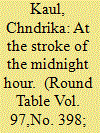

|
|
|
|
|
| Publication |
2008.
|
| Summary/Abstract |
This article examines the portrayal of Indian Independence in the British media with particular attention to the orchestration of official publicity by Lord Mountbatten and his press attach , Alan Campbell-Johnson. The British press was able to portray Independence as a British achievement, arising almost organically out of its long-term policy and vindicating British rule. The article also explores press portrayal of Indian leaders, the Princely States, the role of the Commonwealth and communal violence.
|
|
|
|
|
|
|
|
|
|
|
|
|
|
|
|
| 8 |
ID:
164043
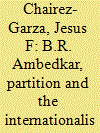

|
|
|
|
|
| Summary/Abstract |
This article analyses the way in which B.R. Ambedkar attempted to internationalise the problem of untouchability in the years prior to Partition. The move towards the international was an attempt to secure a political space for Dalits as a consequence of the Muslim League’s demand for Pakistan. Unable to reach an agreement with the likes of Gandhi and Jinnah, Ambedkar looked beyond India for support. His plight gained the attention of disparate people, including Winston Churchill, Jan Smuts and the members of the Indian Conciliation Group. By exploring these events, this article seeks to rescale the history of untouchability and Partition.
|
|
|
|
|
|
|
|
|
|
|
|
|
|
|
|
| 9 |
ID:
190729
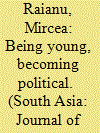

|
|
|
|
|
| Summary/Abstract |
This article discusses the relationship between political subjectivity and urban space in three novels written in the immediate aftermath of the Partition of India: Qurratulain Hyder’s My Temples, Too, Mumtaz Shah Nawaz’s The Heart Divided and Yashpal’s This Is Not That Dawn. Despite extensive thematic and structural similarities, these early Partition novels have never been considered together and through a historical lens. Each narrative features moments of reckoning when the young protagonists are faced with sudden demands to become political in a new way, for example by abandoning secular anti-colonialism for communitarianism. The diversity of their experiences and responses, from bitter resignation to open-ended struggle, reflects the difficulties of constructing unitary selves expressing deep interior convictions aligned with collective identities. These transformations of political subjectivities are situated in and shaped by the heterogeneous urban spaces of Lucknow and Lahore, which establish the conditions of possibility for coexistence and its limits.
|
|
|
|
|
|
|
|
|
|
|
|
|
|
|
|
| 10 |
ID:
183177
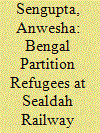

|
|
|
|
|
| Summary/Abstract |
This article focuses on the Sealdah railway station in Calcutta, West Bengal, as a site of refugee ‘settlement’ in the aftermath of British India’s partition. From 1946 to the late 1960s, the platforms of Sealdah remained crowded with Bengali Hindu refugees from East Pakistan. Some refugees stayed a few days, but many stayed for months, even years. Relying on newspaper reports, autobiographical accounts and official archives, this article elaborates how a busy railway station uniquely shaped the experiences of partition refugees. Despite severe infrastructural limitations, the railway platforms of Sealdah provided these refugee residents with certain opportunities. Many preferred to stay at Sealdah instead of moving to any government facility. However, even for the most long-term residents of Sealdah, it remained a temporary home, from where they were either shifted to government camps or themselves found accommodation in and around Calcutta. The article argues that by allowing the refugees to squat on a busy railway platform for months and years, the state recognised a unique right of these refugees, their right to wait, involving at least some agency in the process of resettling.
|
|
|
|
|
|
|
|
|
|
|
|
|
|
|
|
| 11 |
ID:
181673


|
|
|
|
|
| Summary/Abstract |
Bengali Dalit literature has been published for over a century but is yet to be appreciated by a larger mainstream readership. In this essay, I examine how the ‘absence’ of Bengali Dalit literature was constructed by several social, political and ideological factors that together obscured the cultural history of Bengali Dalits. Using literary texts—primarily autobiographies—written by Bengali Dalit authors as an entry point, this essay analyses the explicit and implicit mechanisms of Brahmanical oppression that have prevented Bengali Dalit writers from consolidating their distinct identity. Set against the critical debate regarding the subaltern’s (in)ability to speak and/or be heard, this essay records Bengali Dalit literature’s triumph over casteist endeavours to relegate it to the periphery.
|
|
|
|
|
|
|
|
|
|
|
|
|
|
|
|
| 12 |
ID:
075668
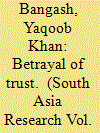

|
|
|
|
|
| Publication |
2006.
|
| Summary/Abstract |
This article analyses why and how the princely order, once considered the bulwark of British rule, came tumbling down so rapidly within a few months in 1947, following the intervention of Lord Mountbatten, a royal cousin, who the princes thought would support them in preserving their rule and privileges. How far were the princes themselves to blame and what role did Mountbatten play? Through a careful re-examination of available sources this article argues that the princes, though unable to act together, trusted the British Crown to protect their rights and interests as promised, but were mistaken in believing that Mountbatten would uphold Britain's treaty obligations regarding the princely states.
|
|
|
|
|
|
|
|
|
|
|
|
|
|
|
|
| 13 |
ID:
152350
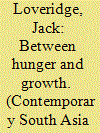

|
|
|
|
|
| Summary/Abstract |
Built from the ground up by three thousand Sikh and Hindu refugees in the aftermath of the Partition of India in 1947, the town of Nilokheri in East Punjab emerged as an unlikely centre of agricultural education and scientific exchange. With support from the Ford Foundation, Indian and American scientists and development planners worked through the 1950s to transform the refugee township into a model of agricultural innovation and community development. Prime Minister Jawaharlal Nehru even cast Nilokheri as the first step on the ‘road to new India’ that would bring the nation to self-sufficiency in food production. Over the course of a decade, experimental farms, workshops, and agricultural training centres rose around the village. The bustling town rapidly became an internationally recognised centre for deploying new farming technologies, training farmers, and sharing scientific knowledge. Yet for all its initial promise, allegations of bureaucratic mismanagement dogged the project, floodwaters disrupted the site in 1957, and Ford’s interest shifted by the early 1960s. The Nilokheri experiment, however, set the stage for the scientific and social interventions of India’s Green Revolution, contributing to an international development paradigm that persists today.
|
|
|
|
|
|
|
|
|
|
|
|
|
|
|
|
| 14 |
ID:
166636
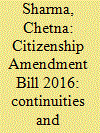

|
|
|
|
|
| Summary/Abstract |
This article is an attempt to unpack how the Citizenship Amendment Bill 2016 that proposed citizenship on the basis of religious affiliation trace its past from narrative rooted in partition and idea of religious identity in determination of citizenship status in India. The act proposes, persons belonging to minority community namely Hindus, Sikhs, Jains, Parsi and Christians from Afghanistan, Bangladesh and Pakistan who have either entered into India without valid travel documents or the validity of their documents have expired are eligible to apply for Indian citizenship by naturalisation in 7 years instead of existing 12 years. Building on existing scholarship, field experience and media reports this article argues proposed citizenship amendment bill that favours citizenship status for persecuted minorities defined primarily as Hindus leaving Muslims is not an attempt to redefine citizenship but reinforce logic that favours narrative of India for Hindus.
|
|
|
|
|
|
|
|
|
|
|
|
|
|
|
|
| 15 |
ID:
139461
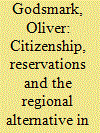

|
|
|
|
|
| Summary/Abstract |
This paper unearths an alternative paradigm through which to consider the discussions and debates between members of the Indian public, government bureaucrats and Congress Party politicians about the rights and interests of Indian citizens both before and immediately after India's Independence in 1947. It argues that much of the recent historical work on citizenship during this period has been preoccupied with issues of nationality and religious community as a result of the fallout from Partition. However, the demands and deliberations over the introduction of provincial forms of affirmative action in the all-India services at this time are indicative of a different narrative. First, many provincial representations of ‘minority’ rights often took into account differences of caste and language instead. Second, and perhaps more importantly, the term minority was employed not only to describe demographic minority status, but also to define under-represented groups in the all-India services. In doing so, these different provincial policies prioritised particular local rights to representation, in which citizenship was expressed through a regional idiom.
|
|
|
|
|
|
|
|
|
|
|
|
|
|
|
|
| 16 |
ID:
172222
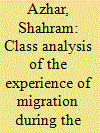

|
|
|
|
|
| Summary/Abstract |
Abstract
The paper conducts a class analysis of the human experience of migration during the Partition of India using a dataset constructed from 1,000 recently published oral narratives by migrants from across the Indian subcontinent. The dataset collates and maps information for four key variables: (1) origins and destinations of migrants; (2) class backgrounds of migrants; (3) modes of transport used during migration; and (4) experiences of direct or indirect violence. Satellite mapping and network analysis are used to develop an empirically grounded cartographic understanding of the relationships between these variables. The results point to a sharply hierarchical story. Differences in class background not only closely correlate with differences in mode of transport and choice of destination, but also with the timing and intensity of an episode of violence. Most importantly, migrants’ experiences show greater similarity within class background and regionality than within a religious group. Thus, not only are discussions based on the conceptual binary of religion unable to account for the large variations in the experiential aspects of Partition, they are also unable to connect these experiences to the broader social structure of the colonial polity in the Indian subcontinent. By reinstating class as an analytical category, this paper seeks to improve our understanding of the humanitarian costs and consequences of the Partition of 1947.
|
|
|
|
|
|
|
|
|
|
|
|
|
|
|
|
| 17 |
ID:
122841
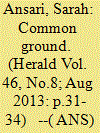

|
|
|
| 18 |
ID:
157083
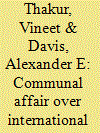

|
|
|
|
|
| Summary/Abstract |
This paper makes an archival journey into the making of institutes of international affairs in late colonial India. By exploring the intertwined lives of two such institutions, it unearths an ideational fight over the study of international affairs in India between the Indian Institute of International Affairs (IIIA), established in 1936, and the Indian Council of World Affairs (ICWA), started in 1943. From the outset, the IIIA was strongly pro-government and saw the ICWA as an institutional rival and a propaganda front for the Indian National Congress (INC). Closer to Independence, the two institutes were increasingly divided along communal and nationalist political lines. The IIIA's leadership became dominated by Muslims and the Muslim League and the ICWA by Brahman Hindus and the INC. As a result, a battle for legitimacy and recognition ensued over participation in international conferences and the ability to publish meaningful research. The ICWA successfully organised the Asian Relations Conference in March 1947, which sealed the fate of the IIIA. It moved to Pakistan in the wake of Partition, then quietly closed down after co-existing briefly with the Pakistan Institute of International Affairs (PIIA).
|
|
|
|
|
|
|
|
|
|
|
|
|
|
|
|
| 19 |
ID:
143319
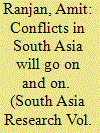

|
|
|
|
|
| Summary/Abstract |
This brief article, an extended review of two recent important publications, problematises the continuity of inter-state and intra-state conflicts since the partition of British India in 1947. Territory and identity are the main triggers of those conflicts, many of which will remain, while others will take on new forms relating to resource scarcity, mainly water. Conflicts are unlikely to be settled fully through various interventions, as sub-dimensions will linger on, develop new roots and new issues will constantly crop up. The article argues that past, present and future are visibly and invisibly connected through the fallout of patterns of myth and memory, dissatisfaction with the status quo and present conditions and often completely unrealistic expectations of a better future. Identifying elements of interconnectedness as central, the review assesses the contributions these two new studies make for a deeper understanding of the scenario of continuing conflict within the context of South Asian Studies.
|
|
|
|
|
|
|
|
|
|
|
|
|
|
|
|
| 20 |
ID:
080902
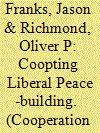

|
|
|
|
|
| Publication |
2008.
|
| Summary/Abstract |
The liberal peace framework aims to regulate, govern and empower the individual in a democratic and pluralist milieu. Yet liberal peace-building, even on the scale and depth employed in the international governance of Kosovo, is susceptible to local cooption, particularly where one group can adopt the language of the liberal peace and has strong support and credibility from the international community. This has led to a focus on achieving statehood for Kosovan Albanians, the marginalization of other identity groups and their agendas, and consequently the undermining of the pluralist goals of peace-building with the implicit cooperation of liberal peace-builders. Given Serb opposition to statehood for Kosovo, there is a danger that liberal peace-building will encourage the partition of Kosovo rather than create a pluralist polity. The article illustrates the susceptibility of liberal peace-building to local cooption
|
|
|
|
|
|
|
|
|
|
|
|
|
|
|
|
|
|
|
|
|